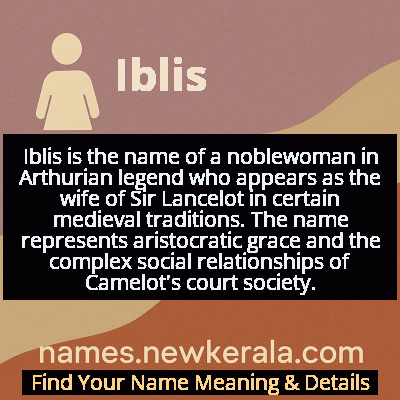Iblis Name Meaning & Details
Origin, Popularity, Numerology Analysis & Name Meaning of Iblis
Discover the origin, meaning, and cultural significance of the name IBLIS. Delve into its historical roots and explore the lasting impact it has had on communities and traditions.
Name
Iblis
Gender
Female
Origin
Arthurian
Lucky Number
6
Meaning of the Name - Iblis
Iblis is the name of a noblewoman in Arthurian legend who appears as the wife of Sir Lancelot in certain medieval traditions. The name represents aristocratic grace and the complex social relationships of Camelot's court society.
Iblis - Complete Numerology Analysis
Your Numerology Number
Based on Pythagorean Numerology System
Ruling Planet
Venus
Positive Nature
Harmonious, responsible, caring, and artistic.
Negative Traits
Overly idealistic, superficial, possessive, or jealous.
Lucky Colours
Pink, turquoise.
Lucky Days
Friday.
Lucky Stones
Diamond, turquoise.
Harmony Numbers
2, 3, 9.
Best Suited Professions
Artists, musicians, teachers, healthcare workers.
What People Like About You
Warmth, nurturing nature, artistic flair.
Famous People Named Iblis
Iblis du Lac
Arthurian Noblewoman
Wife of Sir Lancelot in certain Arthurian traditions
Iblis of Camelot
Court Lady
Prominent figure in Arthurian romances and court life
Lady Iblis
Noblewoman
Character in various Arthurian texts depicting aristocratic women
Name Variations & International Equivalents
Click on blue names to explore their detailed meanings. Gray names with will be available soon.
Cultural & Historical Significance
Extended Personality Analysis
Iblis is characterized by the noble virtues expected of high-born women in Arthurian society. She demonstrates remarkable grace under pressure, maintaining her dignity and position despite the complex romantic entanglements surrounding her husband Lancelot. Her personality suggests deep loyalty and emotional resilience, qualities necessary for surviving in the politically charged environment of Camelot. As a noblewoman, she likely possesses keen social intelligence and diplomatic skills, enabling her to navigate the intricate web of relationships and alliances at court. Iblis embodies the ideal of courtly refinement combined with practical wisdom, representing the type of woman who could maintain her status and influence through intelligence and character rather than overt power. Her steadfast nature provides a counterbalance to the more dramatic personalities in Arthurian legend, suggesting the quiet strength that sustained the Arthurian world behind the scenes of knightly adventure and royal drama.
Modern Usage & Popularity
In contemporary times, the name Iblis remains exceptionally rare and is primarily confined to academic discussions of Arthurian literature or specialized historical contexts. It has not gained traction in mainstream naming practices due to its obscure origins and unfamiliar sound to modern ears. The name occasionally appears in scholarly works analyzing lesser-known Arthurian characters or in creative retellings of the legends that seek to explore underrepresented figures. Its usage is almost exclusively literary or historical rather than practical for modern children. The name's extreme rarity makes it appealing to Arthurian enthusiasts seeking unique historical names, but its lack of established pronunciation and recognition presents significant barriers to wider adoption. It remains a name of specialist interest rather than popular usage.
Symbolic & Spiritual Meanings
Symbolically, Iblis represents the hidden architecture of Arthurian society - the noblewomen who provided stability and continuity amid the dramatic events of knightly quests and royal conflicts. She embodies the concept of quiet influence and the power of social position in medieval aristocracy. The name suggests the complex interplay between public duty and private relationships that characterized noble life, serving as a reminder that behind every famous knight stood women managing estates, alliances, and social networks. Iblis symbolizes the endurance required of noble spouses in a world where their husbands were often absent on quests or battles, representing the strength found in maintaining tradition and social order. Her character metaphorically represents the often-unseen feminine influence that shaped the Arthurian world, highlighting how women exercised power through marriage, diplomacy, and social intelligence rather than through the martial prowess celebrated in knightly tales.

